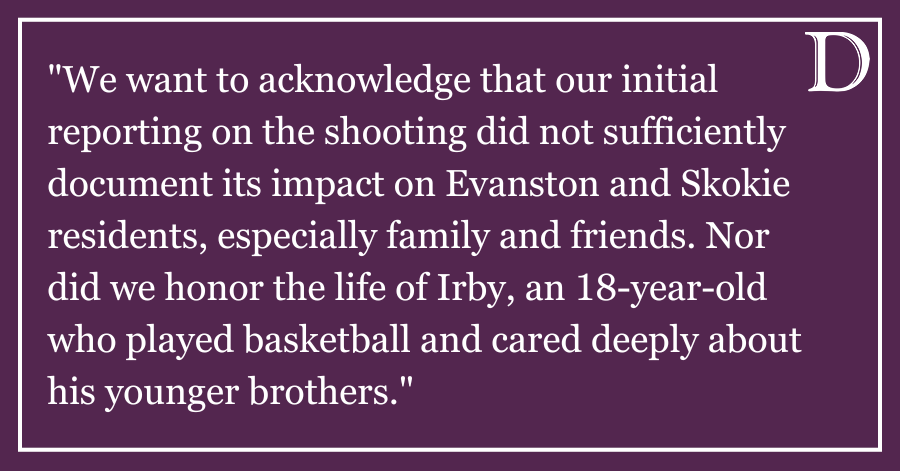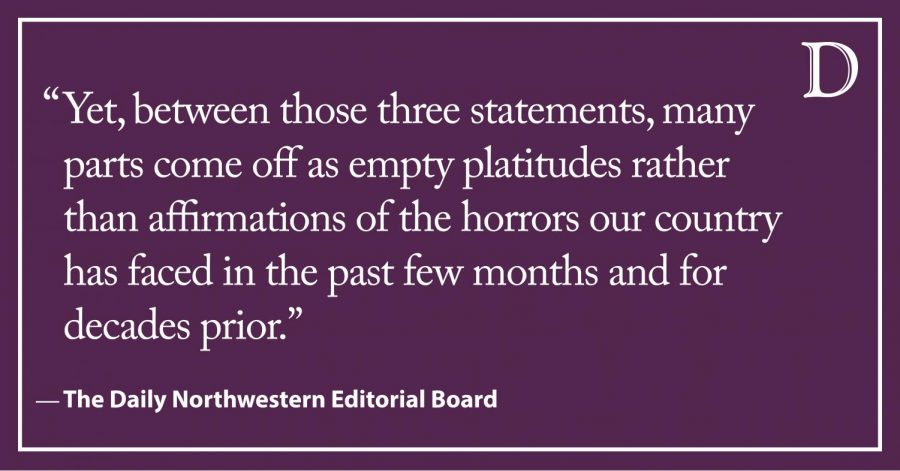It’s been a difficult few months for the Northwestern community. The Evanston Police Department’s announcement earlier this week they would close their investigation into Harsha Maddula’s death put a formal end to a story that has, in many ways, defined the 2012-2013 school year at NU.
Institutional memory is short by nature: Four years from now, it is unlikely that any students here will know who Harsha was, and they certainly will not recall the atmosphere on campus during and after his disappearance.
But that does not mean that the Northwestern community, its equilibrium restored, will necessarily revert to the same attitudes it had before September. Although we don’t want to dwell on Harsha’s death, it is important not to let it slip away from us entirely by the time the class of ’17 arrives on campus. Rather, the lesson that we can all take away from this fall’s tragedy is that we, as a student body, must take care of one another.
It is easy, when we get to college and experience an unprecedented level of freedom, to forget the things we were taught all our lives: not to walk alone at night, for example, or not to go out without someone knowing where we are. Even for students who drink in moderation or only occasionally, it is all too easy for seemingly harmless situations to turn tragic when just a few unfortunate circumstances line up correctly.
Harsha’s death is not merely, as some have portrayed it, a cautionary tale with the moral that we must all stop drinking. That, most people can agree, has nearly no chance of happening: indulgence and overindulgence are facts of life at nearly every university. However, while underage drinking should be curtailed and young adults should be educated about the consequences, there is a bigger lesson to be processed here. We must learn to watch out for our friends when they cannot watch out for themselves. As individuals, we must not be dependent but rather dependable. It is entirely possible to have a good time without putting ourselves in danger, and it is imperative that, should a potentially hazardous situation arise, we ensure that events do not approach tragedy.
The NU community showed remarkable strength, resolve and unity when Harsha went missing. Many freshmen spent their first week on campus not exploring campus with their new classmates, but rather canvassing the Evanston area in search of a young man they had never met. Hundreds of students who had not known Harsha gathered to remember his life after hearing the news of his death. There are countless divisive issues over which the student body could — and does — spend months arguing. When it comes to the loss of one of our own, however, we find it in ourselves to come together.
Harsha’s death is more than just a memory now: it is a starting point. When Alyssa Weaver’s death in November once again sent shockwaves through campus, it did not simply dominate gossip or fade into campus lore. Rather, with the encouragement of Alyssa’s mother, NU has taken a horrific tragedy and used it to better the community. Mental health, with which many students have struggled, is finally occupying a long-sought place in the campus dialogue, and steps have been taken to improve and spread awareness of NU’s mental health resources.
A similar change in the campus conscience is the best possible outcome in the wake of Harsha’s death. As we continue to process what we have learned, we must rely on one another and remember the strength NU can show when its community is threatened. Let us each bring this mentality with us in our friendships and relationships. As we move forward from the events of the fall, it is imperative that we not forget the importance of truly being One Northwestern.
This editorial reflects the opinion of the following members of The Daily’s editorial board: Joseph Diebold, Paulina Firozi, Kaitlyn Jakola, Caryn Lenhoff, Tanner Maxwell, Rohan Nadkarni, Lydia Ramsey, Manuel Rapada and Jillian Sandler.









